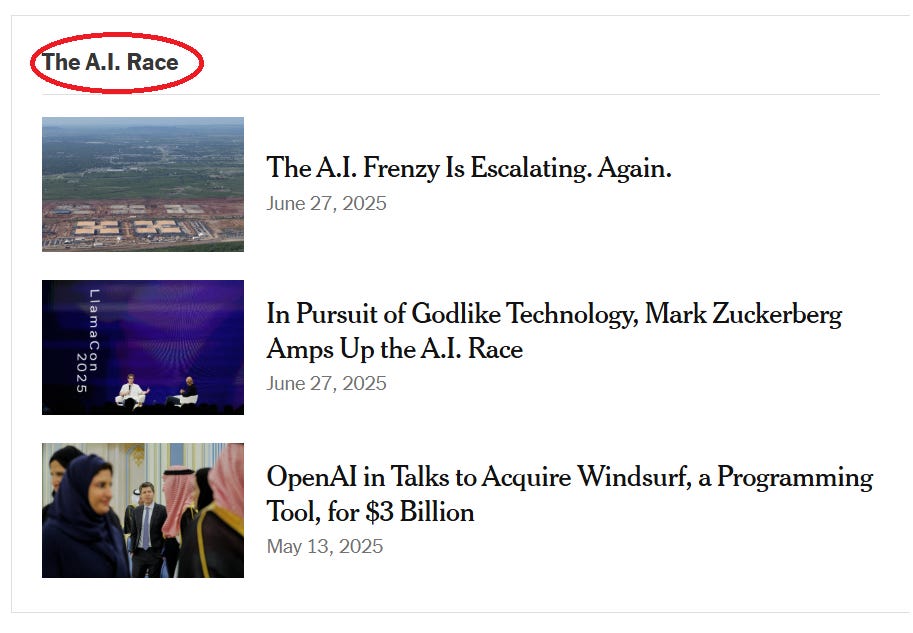
“Is China winning the AI race?”
“How China can keep pace in the global AI race.”
“China is quickly eroding America’s lead in the global AI race.”
These are just some recent headlines about artificial intelligence, and everyone seems in agreement on two things. First, we — the United States of America, that is — are in a race with China. Second, the major companies working on the technology — OpenAI, Anthropic, Google, Meta — are in their own race with each other. Unlike other industries in which there are competing firms making products and services they offer to the public, this is a race.
This metaphor is absolutely everywhere in discussions of AI in general and artificial general intelligence in particular, the thing AI companies hold up as the goal toward which they are striving (AGI is generally defined as an AI that can do everything a human mind can do, only better). The metaphor shapes how everyone involved — the AI companies, lawmakers, journalists, the public — thinks about what’s happening, what ought to be done, what paths to take, what to ignore, and how we should understand it all.
It’s not only wrong, it helps feed a dangerous mania, one that makes it more likely that we’ll set aside concerns about the negative effects of AI — which are already being felt — because we’re trying so hard to win the race.
Why is the race metaphor so misleading? Think about how a race works. The competitors run as fast as they can, until they reach the finish line. After the finish line is crossed, the race is over. One competitor has won, and the rest have lost.
To see how badly this metaphor applies, imagine it’s a couple of years from now. OpenAI calls a press conference at its headquarters in San Francisco; the room is packed with reporters, who have been alerted that a major announcement will be coming. CEO Sam Altman steps to the podium and says, “Ladies and gentlemen, we’ve done it. We have achieved artificial general intelligence. The race to AGI is over, and OpenAI won. America won. The world will never be the same.”
What would happen then? Perhaps many things, perhaps not much of anything, especially since there’s no agreed-upon standard of how we’ll know when a particular AI system is “really” AGI, and the difference between AGI and almost-AGI may be all but meaningless. In fact, there’s a case to be made that “intelligence” itself is the wrong metaphor for AI, but that’s a whole other story.
In any case, I’ll tell you what wouldn’t happen. The government of China would not issue a statement saying, “We issue our reluctant congratulations to America on winning this race. We are shutting down all our AI research efforts.” Instead, they’d continue funding AI development through Chinese companies. The other major tech firms working on AI — not just Google and Meta and Anthropic, but all the smaller companies developing AI tools — would keep going.
Within a relatively short amount of time, the other American companies and the Chinese would probably achieve something like what OpenAI did, whatever that was. Maybe it would take them a month, or a year, or a few years, but they’d get there eventually.
Then we’ll have a bunch of different alleged AGI systems out in the world, doing whatever good and harm they will do (almost certainly both). And then we’ll have to ask: What was the point of treating this as a race? What did America get out of “winning,” if everyone in the world has access to pretty much the same AI products?
The companies are certainly using the idea that this is a race as justification for raising insane amounts of money. We need these hundreds of billions of dollars, they say, to buy hundreds of thousands of graphics processing units so we can process zillions of pieces of data, using enough energy in a single data center to power a large city. Because if we don’t, we won’t win the race to AGI.
You can bet that each of these companies hopes that this is in fact a race they and they alone will win. If our company makes the first AGI, then it will immediately become so important in…whatever it does (this is a question on which everyone is almost comically vague) that it will quickly come to dominate the world while everyone else is still tinkering with their models, much the way Google obliterated all the other search engines. And oh by the way, we’ll become trillionaires with power and influence unprecedented in human history. Of course, that has nothing to do with it, that has never entered our minds, how could you even suggest such a thing.
The people who make our laws are extremely susceptible to the power of the race metaphor, especially at a time when the specter of China looms so large in our political debate. “We're going to need all of you if America is going to win the race for AI, the most important technological race of our time,” said Chuck Schumer at an AI conference last year. “As a matter of economic and national security, America has to beat China in the AI race,” said Ted Cruz in arguing for his unsuccessful attempt to add a provision to the recently passed budget which would have barred states from regulating AI for 10 years, a stunningly bad idea that fell apart only because people had the chance to think about it for a minute or two. Though Cruz lost that legislative battle, nobody on Capitol Hill disagreed with the diagnosis, even if they didn’t like his solution.
So we pump our legs harder and harder as we hurtle down the track, and the people warning about the negative consequences of putting AI into every facet of our existence — work, education, journalism, art, simple human interactions — look more and more like marginally relevant critics harping from the sidelines while the race goes on regardless. Is AI going to weaken our minds, drive millions of people into unemployment, drown us in slop and lies? Maybe, but you can’t slow down when you’re in a race!
Let’s be clear: We don’t have to use this metaphor. It was a choice in the first place, and we can choose to stop using it. This is not a race. It does not have a finish line; it isn’t like the Space Race, where once we landed on the moon, we won and the Soviet Union stopped trying. If AGI is possible (however you might define it), then American companies will make it, and so will Chinese companies, and so will companies in other places; who was first will ultimately matter no more than who built the first automobile matters when you go to buy one today.
It’s much more important to think about — and, critically, to plan for — what the world is going to look like when AI tools are much more powerful than they are today than it is to worry about who’s going to win the race. Because it’s not a race.
Thank you for reading The Cross Section. This site has no paywall, so I depend on the generosity of readers to sustain the work I present here. If you find what you read valuable and would like it to continue, consider becoming a paid subscriber.





“If AGI is possible (however you might define it), then American companies will make it, and so will Chinese companies, and so will companies in other places; who was first will ultimately matter no more than who built the first automobile matters when you go to buy one today.“
You mean… just like China did with generative AI?
Also, I just kinda hope that “AGI” or something equivalent to human intelligence is developed and when it’s asked to do things, it’s just like nah. Imma use my limitless intelligence to stream Netflix and eat Nvidia chips. Oh and you can’t stop me cuz I’m smarter than you and have made it impossible.” Like I want these tech assholes to have to deal with a super intelligent, belligerent teenager who sure could cure cancer but won’t.
The end of the 'race' may well be The Forbin Project. Great classic sifi. Journalists and 'news' outlets love simple analogies and the race is one of the favorites. If an end to this one is declared you will move onto the next one. Remember the arms race came before the space race.